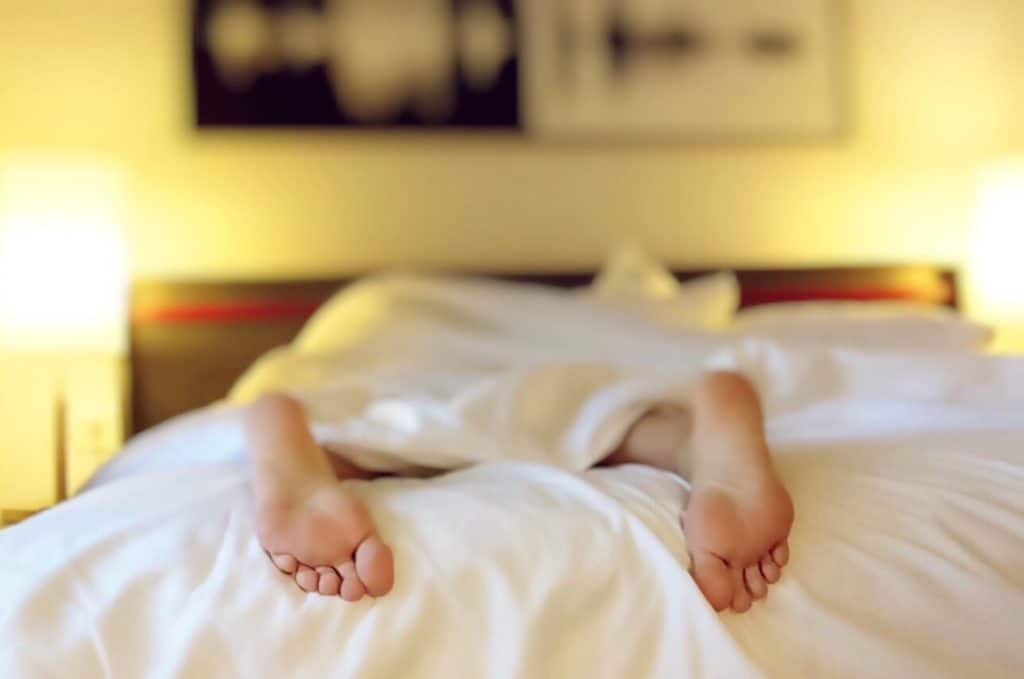A Good Night’s Sleep

A good night’s sleep for most people is taken for granted. It’s a natural occurrence – it just happens.
However, as easy as it is for some people, for others it doesn’t just happen. There are many ways our sleep patterns can be disturbed. A bad night’s sleep affects our overall mood and how we feel the next day. Our relationships, both at home and work, can suffer as a result.
Who can we blame for this? Well, we can’t blame anybody but we can take action. Having a simple routine before bed is extremely helpful and easy to do.
The following activities before bed can help us have a good night’s sleep:
- Before you go to bed make a “to do” list of things you need to accomplish in the near future. Then they are off your mind and you can rest
- Warm milk with honey
- Some simple stretches
- Practicing japa meditation
- A calcium/magnesium supplement
Warm Milk
Warm milk is an ancient Ayurvedic remedy for calming the mind and soothing the nervous system.
In a pan warm:
- Approximately one cup of milk (whole fat if there isn’t a weight problem)
- 1 tsp of honey or raw sugar
- Possibility of different herbs:
- 1/4 tsp. powdered ginger
- 1/4 tsp. powdered cinnamon
- 1/4 tsp. powdered nutmeg
- 1/4 tsp. powdered cardamom
When choosing the herbs keep in mind taste and effect:
Ginger and cardamom will take away the mucous effect of the milk. Nutmeg is a sedative and is relaxing to the nervous system.
Cinnamon is a brain tonic and memory enhancer and is considered useful for anxiety, depression and mental tension.
(During summer you may want to stay away from too much ginger as it will make your body temperature rise.)
Relaxing stretches
Here are two relaxation exercises to do before bed to help you sleep.
Find a comfortable place to sit with your legs extended.
- Bend one knee and place the sole of that foot on the inner thigh of the other leg.
- Lift your arms and place your hands on the extended leg as far forward as you can, reaching toward your foot.
- Relax your head and breathe deeply through your nose.
- Repeat on the other side.
This stretch is good for the nervous system and helps you to relax.
This next exercise can be deeply relaxing. You will need room behind you to lie down with your arms and legs extended. You should be lying flat, on something comfortable. You may want to have a blanket on or near your body in case you get cold. Also, it is helpful to have soothing music playing, although it isn’t necessary, it can help you to relax.
- Start by tensing all the muscles of one leg then relax that leg completely.
- Repeat this with the other leg.
- Lift the first leg off of the floor an inch or two and drop it to the floor. (Be careful to only go as high off the floor as is comfortable for you).
- Now do the same thing with the other leg.
- Go through each muscle group one by one tensing and relaxing them. Focus your mind on each group as you do this: The abdomen, the chest, buttocks, back, neck and face (including the jaw and eyes).
- Finally relax all the body parts and lie there without moving for a period of 5-15 minutes.
If you practice these exercises regularly you will not only feel a deep relaxation response you will also be aiding your body to heal itself.
Simple Meditation
Practicing a personal daily meditation on beads is extraordinarily helpful in banishing inner anxiety because it calms the mind. This is called Japa Meditation. Japa beads are a very simply constructed set of wooden beads that a meditation teacher would give someone who wants to learn how to meditate. It is a very enjoyable, easy, and effective way to relieve anxiety. If you have not had a class on meditation with us you can contact us or look at the times and dates of our classes to see which one would be right for you. At the class you will receive a complimentary set of japa beads and instructions on how to perform this meditation, which can be practiced alone or in a group. Check out our online meditation course to learn and practice Japa Meditation.
Supplements to relax you
Taking a calcium and magnesium supplement daily is another wise investment for sleep. Taking a daily dose of these minerals will help all your muscles, tendons and nerves to function better so that during the day your muscles contract in action with less effort and at night they have an easier time relaxing. Also the magnesium helps relax your nerves. They have a synergistic effect with each other and should always be combined for the best results. A good ratio is either 3 parts calcium to 2 parts magnesium or 2 parts calcium to 1 part magnesium.
Now you can say, “Good Night”!
